Farming
Thousands of farmers descend on Cardiff to say: ‘Enough is enough!’
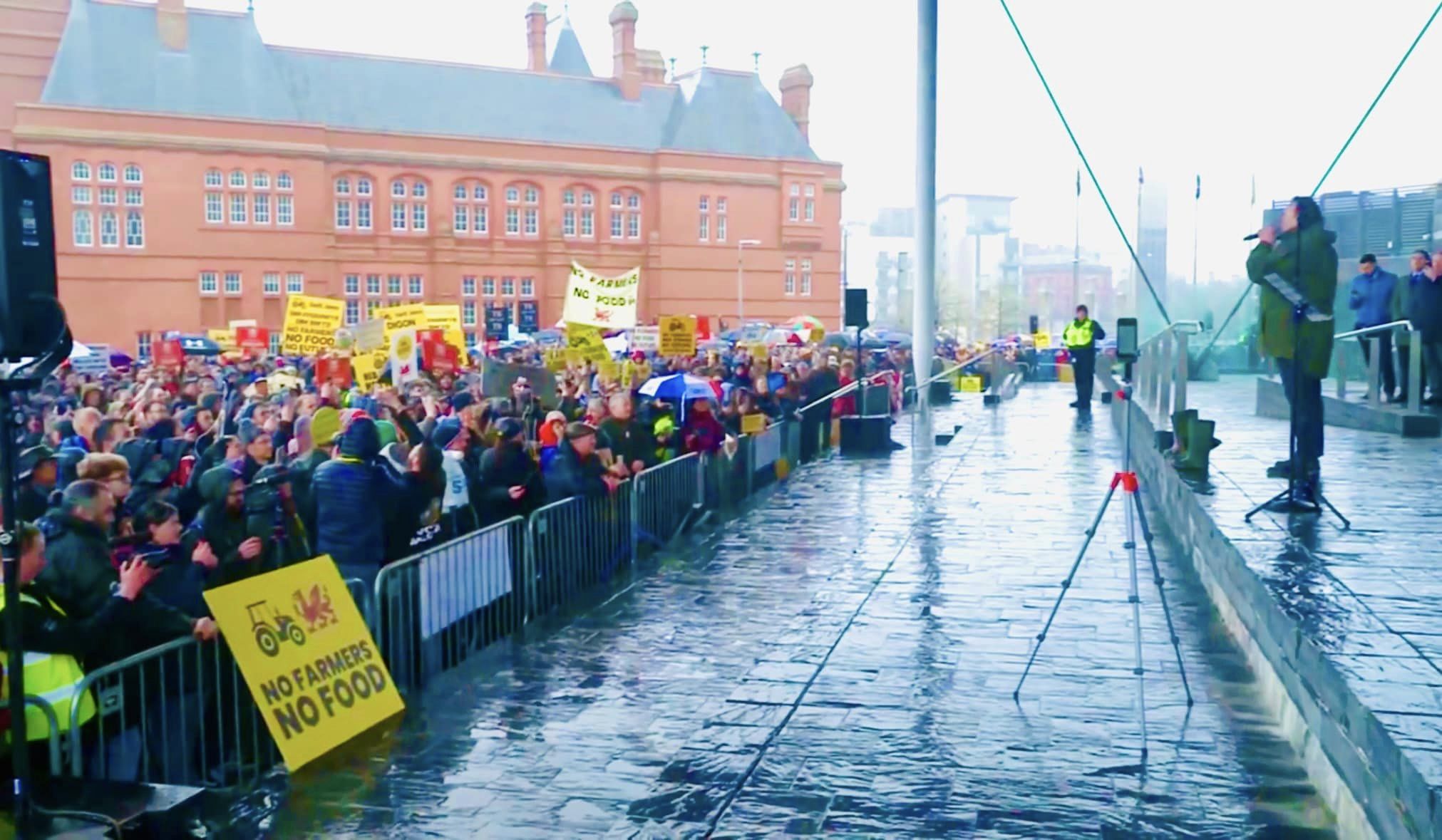
THOUSANDS of farmers and supporters converged outside the Senedd in Cardiff, Wales, to voice their strong opposition to the Welsh Government’s proposed Sustainable Farming Scheme (SFS) and other contentious issues threatening the agricultural sector. The protest, marked by a sea of placards bearing the stark message “No Farmers, No Food,” highlighted the depth of the farming community’s fears for its future.
The demonstration, the latest in a month-long series of actions across Wales, saw farmers, many arriving on tractors, gather to contest plans they argue would compel them to sacrifice a significant portion of their land for environmental purposes. With estimates suggesting that the scheme could lead to 5,500 job losses, the stakes for the agricultural community and rural Wales are high.
Despite police estimates putting the crowd at around 3,000, below the anticipated 10,000 to 20,000, the turnout was a record for a protest of this nature outside the Welsh Parliament. The demonstration saw a mix of solemnity and spirited resistance, with the Welsh song ‘Yma O Hyd’ resonating amongst the crowd, symbolising steadfastness and resilience.
At the demonstration, notable figures lent their voices to the farmers’ cause. Andrew RT Davies, leader of the Welsh Conservatives in the Senedd, was seen engaging with protesters, underscoring the political dimensions of the dispute.
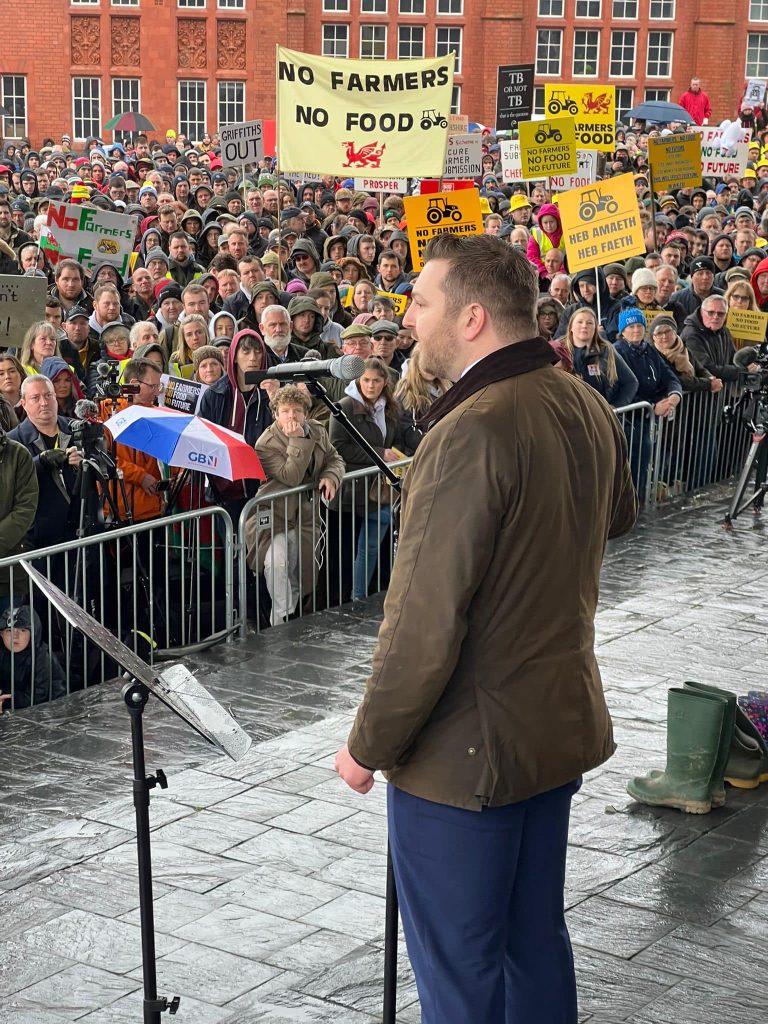
Sam Kurtz, another Conservative MS, told the crowd that he was a farmer’s son. He told the gathering that he would fight tirelessly for the farming community.
Afterwards he told The Pembrokeshire Herald: “It was the proudest moment of my life addressing the farmers in Cardiff Bay today. Made prouder still that my father was there.

“The momentum is with the industry now and whomever becomes Wales’ next First Minister, and next Rural Affairs Minister, must work hard on the SFS, NVZs, and Bovine Tb, to repair a broken relationship between government and the agricultural sector.
“Can I thank all those who attended the protest for the respect and order that they showed.
“It was the largest of its kind and if the message hasn’t got through to the Welsh Government now, I’m not sure it ever will.”
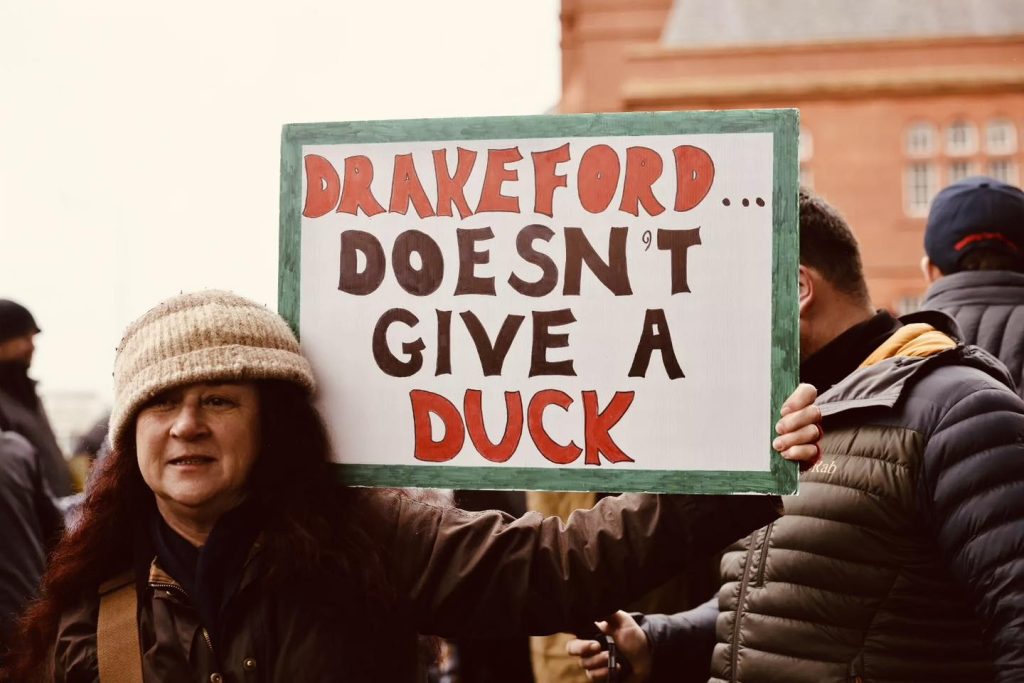
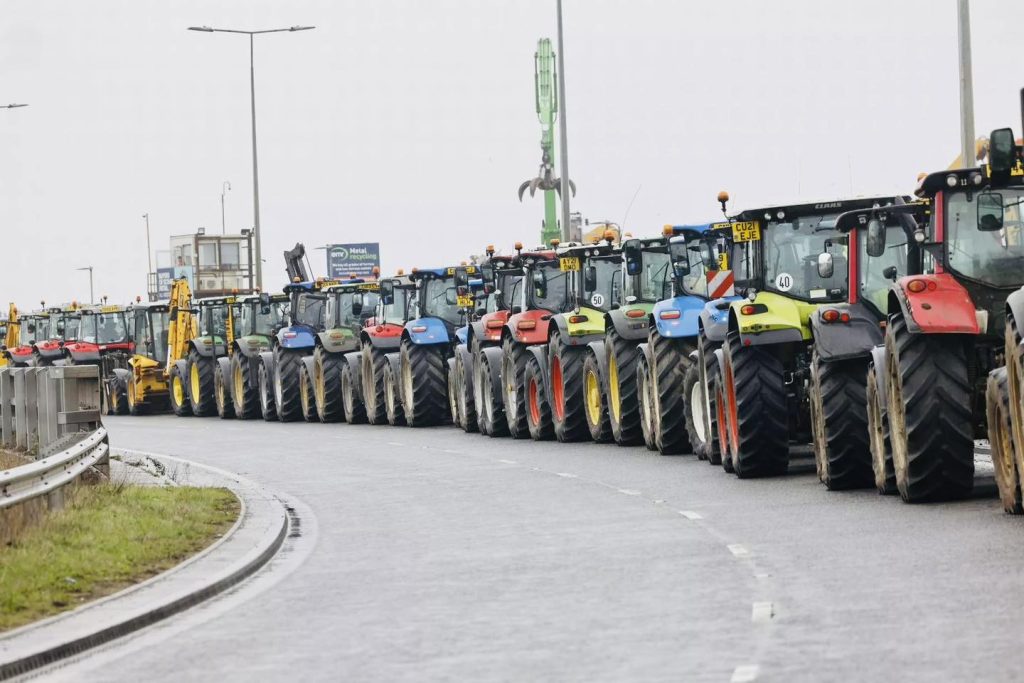
Perhaps more movingly, Nigel Owens, renowned former international rugby referee and a farmer himself, addressed the crowd from the Senedd steps. Owens, comparing the protest’s significance to his experience refereeing the 2015 World Cup final, underscored the fundamental role of farming: “There can be no Six Nations game in Cardiff next Saturday against France if there is no referee. There can be no food on the table if there are no farmers.”
The protest was not just a platform for airing grievances but also a moment for collective expression of a deep-seated love for farming and the rural way of life. Ioan Humphreys, a fifth-generation farmer, poignantly articulated this sentiment, emphasizing the fight for the future of young farmers and the unity required to overcome current challenges. “I’m also here to make sure as farmers stick together and unite through this time of hardship,” Humphreys stated, capturing the protest’s spirit of solidarity.
Rhun ap Iorwerth, leader of Plaid Cymru, reiterated the essential bond between Wales and its agricultural heartland, advocating for government support at all levels to ensure the vitality of rural Wales. His call for action highlighted the broader implications of the proposed changes, touching on the sustainability of rural communities, biodiversity, and the Welsh economy at large.
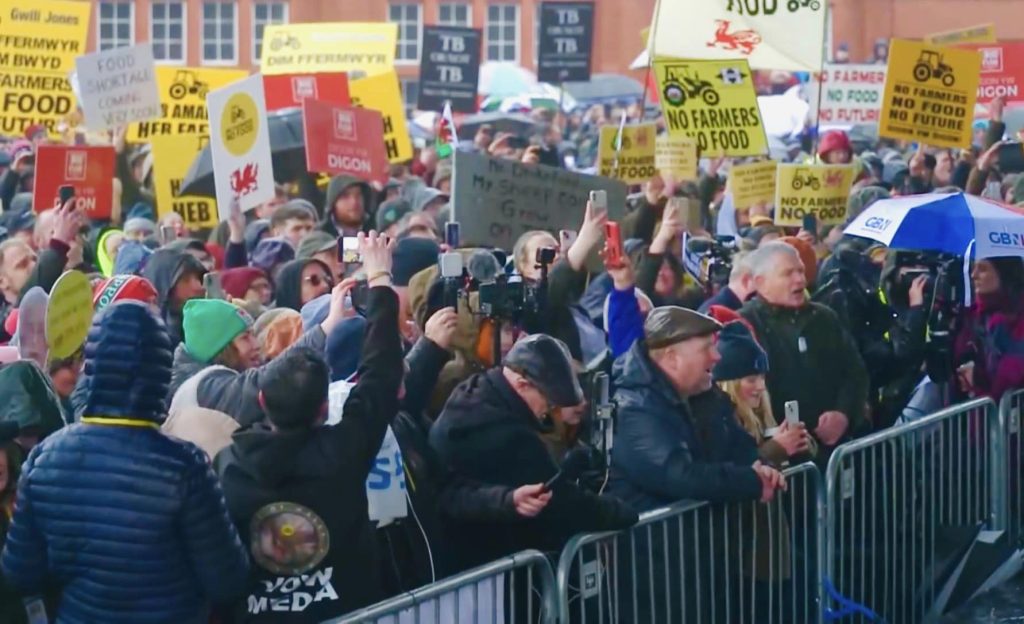
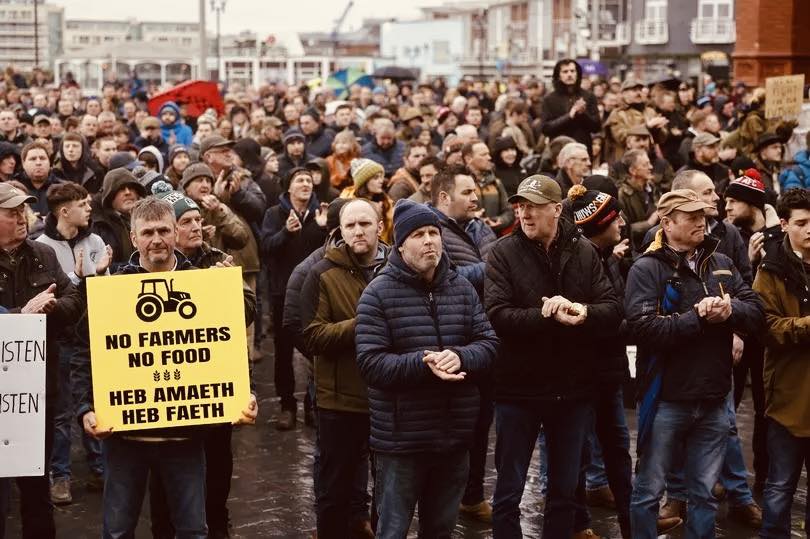
The protest, while a manifestation of immediate concerns over the SFS, also brought to the fore ongoing frustrations with the Welsh Government’s anti-water pollution measures and the persistent challenge of TB in cattle. The demonstration’s peaceful nature, emphasized by South Wales Police’s statement, belied the deep undercurrents of anxiety and determination among the farming community.
Prime Minister Rishi Sunak’s interaction with the rural community at the Welsh Conservative Party Conference in Llandudno, where he assured farmers of his support, underscores the national significance of the issues at stake. Meanwhile, the Welsh Government’s assurance of its willingness to listen and adapt the proposed scheme following consultation reflects the dynamic and contentious process of policy-making in areas critical to national interest and well-being.
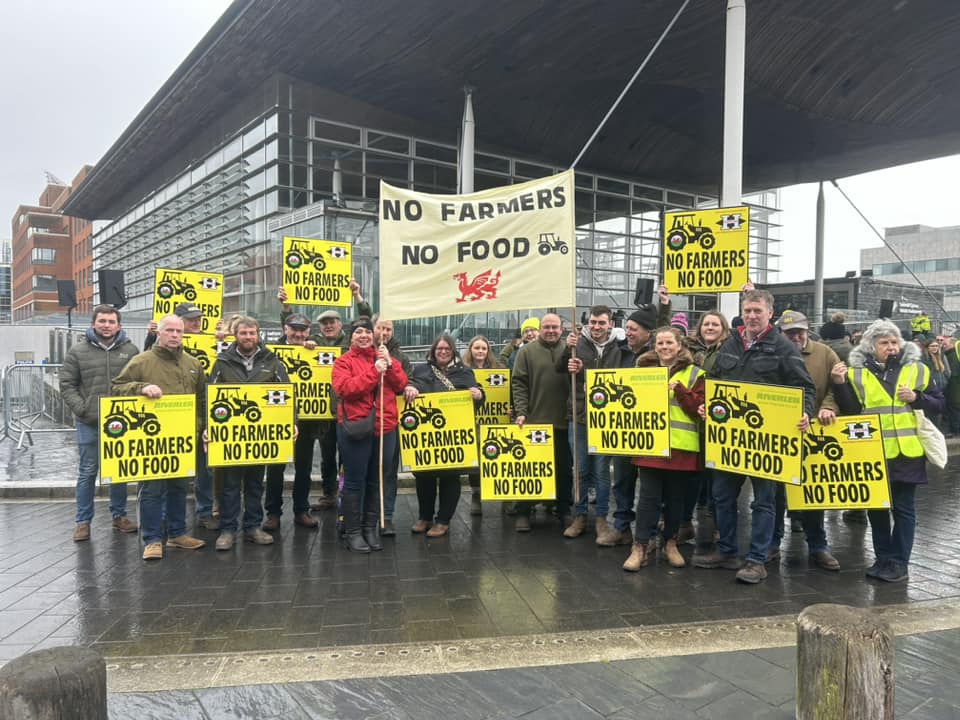
As the protest unfolded, with wellington boots symbolically placed in front of speakers, the agricultural community’s message was clear: the future of farming, and by extension, the fabric of rural Wales, hangs in the balance. The collective call for support, understanding, and meaningful engagement from the government resonated beyond the steps of the Senedd, touching the hearts of many across Wales and beyond.
This convergence of farmers at the Senedd, while a significant moment, represents just one chapter in an ongoing dialogue between the agricultural community and policymakers. As Wales navigates the complexities of environmental conservation, economic sustainability, and rural livelihoods, the voices of those gathered in Cardiff Bay will undoubtedly continue to echo in the halls of power, reminding all of the indispensable value of farmers to the nation’s past, present, and future.
Community
Celebrating nature recovery through Cysylltu Natur 25×25

A CELEBRATION event was held on Saturday, January 24 in Cwm Gwaun to mark the achievements of Pembrokeshire Coast National Park Authority’s Cysylltu Natur 25×25 project, bringing together volunteers, farmers and staff involved in delivering nature restoration across North Pembrokeshire.
The landscape-scale project was funded by the Welsh Government through the Nature Networks Programme, delivered by the Heritage Fund. The Programme aims to strengthen ecological connectivity and resilience by restoring habitats at scale.
Those attending the event heard about the wide range of conservation activity delivered through the project across the north of the National Park. This has included practical works to restore grazing to Rhos pasture to benefit marsh fritillary butterflies and southern damselflies, specialist work to conserve rare lichens, volunteer chough, dormouse and harvest mouse monitoring, safeguarding greater horseshoe bat hibernation sites, and targeted action to tackle invasive species threatening important sites.
Volunteers, farmers, land managers and contractors played a vital role in the success of the project, contributing local knowledge, practical skills and ongoing commitment to caring for Pembrokeshire’s unique landscapes and wildlife in the long term.
Mary Chadwick, Conservation Officer for Pembrokeshire Coast National Park Authority, said: “Cysylltu Natur 25×25 has shown what can be achieved when farmers, volunteers and conservation specialists work together with a shared aim.
“From monitoring some of our most elusive species to restoring and protecting habitats, the dedication of everyone involved has made a real difference for nature across the National Park.”
Although the Cysylltu Natur 25×25 project is now coming to an end, the important work it has supported will continue. Building on its successes, Pembrokeshire Coast National Park Authority will carry this momentum forward through the next phase of nature recovery work under NNF4 Cysylltiadau Naturiol / Naturally Connected, ensuring ongoing protection and enhancement of habitats for future generations.
Farming
Judicial review granted for hundreds of farmers and landowners in Wales

OVER three hundred Welsh farmers and landowners have been granted the right to legally challenge Green GEN Cymru’s ‘unlawful behaviour’ at the High Court.
The collective filed a judicial review application on behalf of the community groups, Justice for Wales and CPRW, on four separate grounds, including claims that the energy company has acted unlawfully and with disregard for biosecurity and the environment, while trying to gain access to private land to conduct surveys for three major overhead pylon routes.
The proposal will see the energy infrastructure and pylons spanning 200 km across Powys, Ceredigion, Carmarthen, and Montgomeryshire in Wales and across the Welsh border into Shropshire, in the West Midlands of England.

Mrs Justice Jefford granted permission on four grounds – including abuse of power and procedural impropriety – during the three-and-a-half-hour hearing at Cardiff Civil Justice Centre on Tuesday, January 20.
A two-day hearing is expected to take place in April 2026, date to be confirmed.
The judge also accepted an undertaking from Green GEN Cymru that it would not enter land using s.172 powers – the right given to acquiring authorities to enter land to conduct surveys or valuations under the Housing and Planning Act 2016 – until an urgent interim relief application hearing can be held.
Natalie Barstow, founder of Justice for Wales, said: “This is a moment of vindication. For months, we have been left feeling unsafe in our own homes and stripped of our power as farmers and landowners.
“This is not a protest against renewable energy; this is about standing up for what is right. Our right to dignity and to have a voice, and for the future of our land, wildlife, and livelihoods.
“Since we began this battle, hundreds of other farmers and landowners across Wales have come forward with similar stories, and we’ve been supported by many generous donations to fund the legal challenge. We knew we weren’t alone in our concerns, but the response demonstrates it is a far wider issue than we initially feared, and why it is so important that Green GEN’s conduct and protocols are properly scrutinised.
“We said we will not be bullied into submission, and this judgment is just the first foot forward in our fight for justice.”
Mary Smith, a lawyer at New South Law, the law firm representing the impacted communities, said: “Holding acquiring authority status does not entitle a company to disregard the limits of its statutory powers or the rights of the people affected.
“The Court’s decision confirms that Green GEN Cymru must be held to the same legal standards as any other public body when exercising intrusive powers over private land. This case is about restoring fairness, accountability, and respect for the communities whose livelihoods and environments are at stake.”
Farming
New rules to make Welsh lamb pricing clearer set to begin next week

Mandatory carcass grading and price reporting will be required in slaughterhouses from Wednesday, January 28
WELSH sheep farmers are set to see new rules introduced next week aimed at making the lamb market fairer and more transparent.
From Wednesday (Jan 28), slaughterhouses in Wales will be required to classify sheep carcasses and report prices using a standardised system. The Welsh Government says the move will improve consistency in grading, make price information easier to compare, and help build confidence for farmers selling stock.

Deputy First Minister Huw Irranca-Davies announced the change during the Farmers’ Union of Wales (FUW) Farmhouse Breakfast event at the Norwegian Church in Cardiff.
He said the measures would support the industry by ensuring a consistent methodology for classifying carcasses in slaughterhouses, promoting transparency, fairness and productivity within the sheep market.
“Our iconic Welsh lamb is celebrated around the world for its outstanding quality and high production standards,” he said. “These measures will implement a consistent methodology for classifying sheep carcasses in slaughterhouses, promoting transparency, fairness, and increased productivity within the sheep market.”
The regulations bring the sheep sector into line with rules already used for beef and pork.
Hybu Cig Cymru – Meat Promotion Wales chief executive José Peralta said the changes would allow for greater data capture and analysis and improve transparency within the supply chain.
He said: “The new regulations, which now align with a similar position for cattle and pigs, will allow for greater data capture and analysis to be undertaken and support increased transparency within the sector. As a sector we must seek all opportunities for greater transparency within the supply chain to ensure that choices can be made from an informed position.”
The Welsh Government says the new approach is part of a wider UK framework, with similar arrangements already operating elsewhere.
During his address, the Deputy First Minister also pointed to further changes expected in 2026, including the planned introduction of the Sustainable Farming Scheme, which the Welsh Government describes as a new partnership between the people of Wales and farmers.
The scheme is intended to support the sustainable production of food while also responding to the climate and nature emergency.
The Welsh Government has also confirmed its commitment to financial support during the transition, with up to £238 million committed to the Universal layer and the legacy Basic Payment Scheme in 2026.
Deputy First Minister Huw Irranca-Davies said: “I would like to reiterate the Welsh Government’s commitment to supporting Welsh family farms, not just in the short term but also in the long run. Our goal is to prioritise stability for the farming industry, ensuring to balance this with sustainability at its very core.”
He added that supporting farmers through the change would be a priority, with consistent advice and support offered across the sector.
Building fairness within the agricultural supply chain remains a key Welsh Government priority, which it says is also integral to food security.
-

 Health7 days ago
Health7 days agoConsultation reveals lack of public trust in health board
-

 News2 days ago
News2 days agoPrincess of Wales visits historic Pembrokeshire woollen mill
-

 Crime13 hours ago
Crime13 hours agoSex offender jailed after living off grid in Pembrokeshire and refusing to register
-

 Crime6 days ago
Crime6 days agoPembroke man accused of child sex offences sent to Swansea Crown Court
-

 Health4 days ago
Health4 days agoDoctor struck off after sexual misconduct findings at Withybush Hospital
-

 Community6 days ago
Community6 days ago50s women threaten legal action over pension compensation refusal
-

 Business7 days ago
Business7 days agoEight-year prison sentence after vehicle stop uncovers drugs worth over £150,000
-

 Crime2 days ago
Crime2 days agoHakin man’s appeal delayed again as Crown Court seeks guidance on insurance law


































